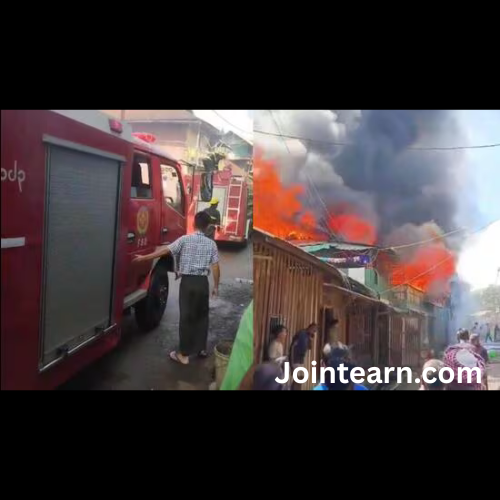
In an extraordinary instance of cross-border cooperation, firefighters from Myanmar crossed into Indian territory to help extinguish a fire that devastated several homes in Moreh, a key border town in Manipur. The incident occurred on Saturday morning in Ward 5 of the town, which lies in Tengnoupal district, near the India-Myanmar boundary. According to local police, no casualties were reported, though the fire caused significant property damage.
The exact cause of the fire is yet to be conclusively determined, but officials suspect that a short circuit may have triggered the blaze around 11 am. The fire rapidly spread to at least ten houses in the densely populated area. Initial efforts by the Manipur Fire Service, local police personnel, commandos, and units of the Assam Rifles struggled to contain the flames due to the speed at which the fire engulfed multiple structures.
In this critical situation, a team of Myanmar firefighters crossed the border to assist their Indian counterparts. The additional manpower and equipment proved instrumental in preventing the fire from spreading further. A senior police officer, requesting anonymity, told reporters that “the fire spread immediately, and our firefighters were unable to control it on their own. Moreh could have been much worse if the backup teams from Myanmar had not arrived in time.” The officer confirmed that all residents of the affected houses were safely evacuated.
Residents and eyewitnesses highlighted the swift and coordinated efforts of all responding agencies. Local villagers initially attempted to douse the fire using buckets and makeshift equipment, but the intensity of the blaze made it impossible to contain without professional intervention. The combined efforts of Manipur and Myanmar fire personnel, along with security forces, ultimately brought the fire under control.
Moreh holds significant strategic and economic importance as a major trade center and business hub in Northeast India. It has historically served as a key entry point for goods imported from Myanmar and other Southeast Asian countries via land routes. The Indo-Myanmar Friendship Gate, a vital checkpoint for trade and movement between the two nations, was indefinitely shut down on March 9, 2020, due to the COVID-19 pandemic. Subsequent unrest in both Manipur and Myanmar prolonged the closure. The gate was eventually reopened during operations to deport illegal Myanmar nationals from Manipur, restoring limited cross-border trade and travel.
The recent fire highlights both the challenges and the potential of cross-border collaboration in the region. In areas like Moreh, which are susceptible to natural and accidental disasters, rapid support from neighboring countries can play a critical role in minimizing damage and preventing casualties. Officials said that the cooperation displayed by the Myanmar fire team reflects longstanding ties between the two nations and may set a precedent for future joint responses to emergencies along the border.
Authorities in Manipur are continuing their investigation to determine the precise cause of the fire. Once established, preventive measures are expected to be implemented to reduce the risk of similar incidents in the future. Meanwhile, local administration officials have assured residents of support in rebuilding the damaged homes and restoring normalcy to the affected neighborhoods.
The incident has drawn attention to the importance of disaster preparedness in border towns, which often face unique challenges due to their proximity to international boundaries. Coordination between Indian and foreign emergency services can significantly improve response times and reduce the impact of unforeseen incidents such as fires, floods, or other disasters.
This fire, while alarming, did not result in any fatalities or serious injuries, thanks to timely evacuations and the concerted efforts of multiple agencies. It serves as a reminder of both the vulnerability of densely populated areas in border regions and the effectiveness of international cooperation in crisis management.


Leave a Reply